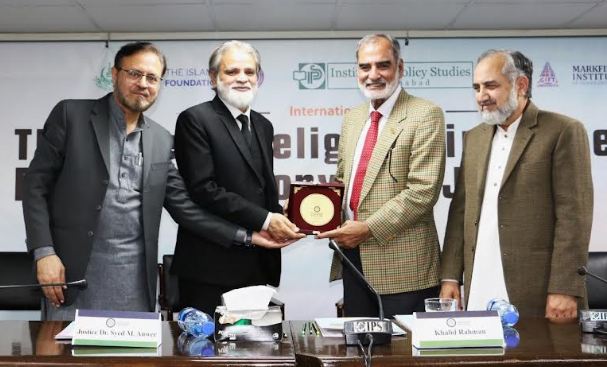Peace and justice hindered by actions of followers, not religion: Justice Syed Mohammad Anwer

DNA
ISLAMABAD, Dec 10: Challenges to peace and justice largely arise from the misinterpretations and actions of followers rather than the essence of religion itself. Manipulated religious teachings, used for personal, political, or ideological gains, frequently fuel conflicts. In this context, a common ground for global unity through diverse paths can be established by teaching and embodying the true essence of faith.
This was said by Justice Dr Syed Muhammed Anwer, judge, Federal Shariat Court, at the concluding session of an international seminar titled “The Role of Religions in Fostering Peace, Harmony, and Justice,” held at the Institute of Policy Studies (IPS), Islamabad. The session was also addressed by Khalid Rahman, chairman IPS, Ambassador (r) Syed Abrar Hussain, vice chairman, IPS, and Prof Dr Mohyuddin Hashmi, dean, Faculty of Arabic and Islamic Studies, Allama Iqbal Open University, Islamabad.
Justice Syed Anwer, drawing attention to Pakistan’s unique constitutional and symbolic recognition of religious minorities, highlighted the reflection of religious inclusivity in the national flag and its definition of minorities. Unlike many nations, Pakistan’s framework considers minorities solely based on religious beliefs, not caste, color, or creed, ensuring equal constitutional rights for all citizens. However, he acknowledged that the ideal of equality is not always reflected in practice, urging a renewed focus on teaching and promoting the true values of religion.
Exploring the contrasting experiences of minorities in secular and religious states, the speaker pointed out that secular states often face challenges in ensuring the safety and rights of their minority populations. He emphasized the multifaceted nature of the issue, noting that faith communities need to prioritize the dissemination of their core messages of peace and mutual respect.
Presenting his insights on the way forward, Khalid Rahman underscored the complexity of creating a just environment, emphasizing that the prevailing narratives and structures are often shaped by powerful elites who primarily benefit from the status quo. He stressed that the challenges attributed to religion are equally rooted in governance and decision-making processes dominated by these elite groups.
He argued that the inequities and conflicts observed globally are not the result of religious teachings but stem from systemic issues perpetuated by those in authority. Highlighting the global arms trade as an example, he noted that the largest weapons producers are also the nations advocating peace, illustrating the contradictions in elite-driven policies.
He called for a critical examination of governance structures and the roles of all stakeholders, urging a shift from assigning blame to religion toward addressing the socio-political systems and economic interests that drive inequality and conflict.
Earlier, Ambassador Abrar Hussain shared the key takeaways from the day-long seminar, noting the enduring relevance of religion in addressing humanity’s quest for peace, justice, and harmony amidst modern challenges. He emphasized that while secularism and irreligiosity dominate many societies, religions continue to offer a unique moral framework essential for fostering inclusivity, empathy, and coexistence. He reiterated that faith communities must introspect and engage collaboratively, focusing on moral appeal over coercion, to counter the misuse of religion for violence, prejudice, or political agendas.
The session concluded with a call for collective responsibility by Dr Mohyuddin Hashmi. He urged religious leaders and communities to counter violence and prejudice, prevalent across all religions, by teaching and embodying the true essence of their faiths.
Related News

Eye examination of Imran Khan underway at Adiala jail
ISLAMABAD, FEB 15: The eye examination of Pakistan Tehreek-e-Insaf (PTI) founder Imran Khan is underRead More

Tremors felt in Balochistan’s Kharan district; no damage reported
QUETTA, FEB 15: Tremors were felt in the Kharan area of Balochistan on Friday, promptingRead More


Comments are Closed